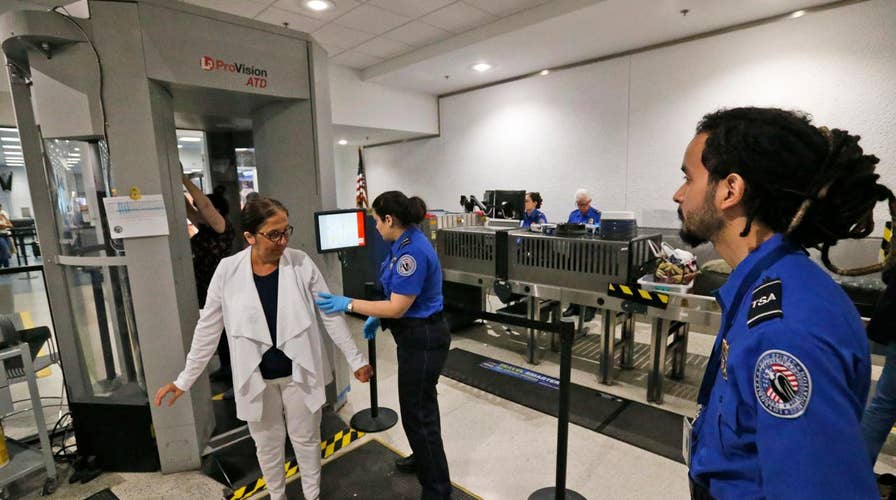TSA tests expanded electronics screening at select airports
New procedure may go nationwide; Doug McKelway reports
Homeland Security Secretary John Kelly met with Transportation Security Administration personnel at Ronald Reagan Washington National Airport on Friday to observe passenger screening ahead of Memorial Day weekend –this, as the TSA is testing new security procedures for carry-on baggage.
The TSA Wednesday introduced new screening protocols for carry-on bags at about a dozen U.S. airports, and they could potentially expand to other airports nationwide.
The program will require travelers to place any electronics larger than a cell phone in a separate bin for X-ray screening. According to the TSA, officials at the security checkpoints may also advise travelers to place other carry-on items in separate bins.
“TSA’s top priority is to protect the traveling public, and every policy and security procedure in place is designed to mitigate threats to passengers and the aviation sector—which we know our adversaries continue to target,” a TSA official told Fox News.
U.S. transportation, specifically the aviation system, has been a top terrorist target since 9/11, and as part of the TSA’s counterterrorism efforts, the agency adjusts security screening procedures to “stay ahead” of “evolving threats.”
"I am very confident we're doing a very effective job in protecting, that said it's a constant threat and we have to be vigilante," Kelly said on Friday. "We're looking at raising the bar on aviation security."
Kelly said DHS is working with partners, airlines, and counterparts worldwide as they contemplate expanding the electronics ban.
Kelly’s meeting with TSA officials Friday comes as the Department of Homeland Security continues to consider whether to expand the electronics ban implemented in March.
The initial ban of certain electronic devices on U.S.-bound flights from 13 international airports was due to reports of increased terror threats that suggested Al Qaeda and other groups were looking to smuggle explosive materials onboard planes. The ban also renewed post-9/11 regulations on liquids on planes.
“Implementing additional security measures enhances our ability to mitigate further attempts against the overseas aviation industry,” DHS said on its website.
According to DHS, the airports affected by the initial ban are: Jordan’s Queen Alia International Airport, Cairo International Airport, Ataturk International Airport, Saudi Arabia’s Kin Abdul-Aziz International Airport, Morocco’s Mohammad V Airport, Qatar’s Hamad International Airport, Dubai International Airport, and Abu Dhabi International airport.
U.S. officials have told airlines to “be prepared” for an expanded ban on carry-on electronic devices allowed on airplanes, but an official policy change has yet to be announced.
"We'll make a decision when the time is right," Kelly said.
Fox News' Jake Gibson contributed to this report.






















